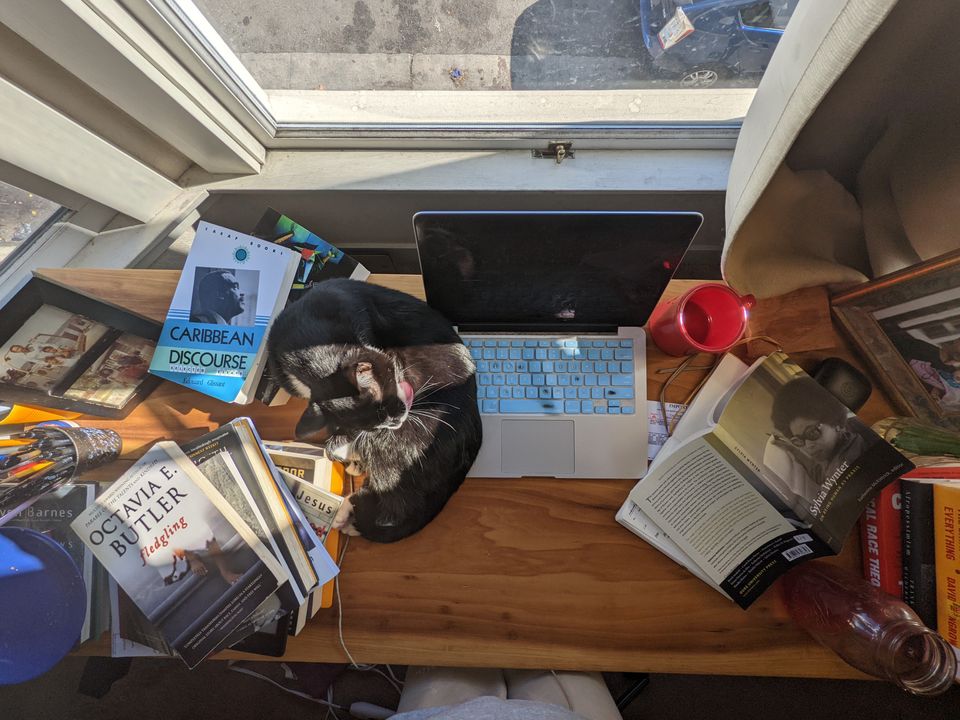November

Hello!
Remember November? Me neither. It came and went, bringing a cold and wet front that has sunk its soggy paws into Oakland, and refuses to withdraw. I read a lot, shallowly, while writing an academic paper. I wrote a lot, both shallow and deep. And now I am tired, curving into December on fumes.
Here is the fuel from November: what gassed me up, lit my fire (and may light yours, too).
Story Collection
I read about John Keene's Counternarratives in Samuel Delany's About Writing—an excellent primer on everything from Delany's take on plots (they don't really exist; and if they do, they're not a very interesting way to think about the structure of a story), to characterization (don't violate the reader's sense of psychological veracity: if your protagonist is short, Black, poor, and powerful, you'll need to explain why), to experimental writing (during which I was sure he had discussed Counternarratives, but now that I flip through my dog-eared copy, I realize, after checking the publication date of About Writing, 2005, against that of Counternarratives, 2015—is a counterfactual counternarrative all its own).
So, never mind about learning of it through Samuel Delany, at least through that particular book.
From "A Letter on the Trials of the Counterreformation in New Lisbon":
Now that he was looking João Baptista in the eyes, he considered that he had never really observed him, never seen him before. The face was crystalline in its familiarity, but not from regular viewing; it was as if he had glimpsed this face somewhere else, on an inner mirror, and what he had seen for nearly his entire stay at the house had been merely an outline, a mask, a shadow.
Counternarratives, a series of short stories and at least one novella that consider generally esoteric moments in history—queer Brazilian slave revolts, Manhattan's first immigrant, a fire the destroys a Catholic convent—is sublimely transformative. Each time I finish a story (or novella), I put the book down, and consider what has just happened inside of me. Strange, eery feelings, revelations of a refracted history, the sense of having opened a door and found myself in another version of reality, just as exquisitely transcribed as this one, and only slightly less familiar.
Novel
NK Jemisin is undoubtedly one of the most brilliant writers working today, and I suspect that we will be contending with the transformation her work—especially The Broken Earth Series—launched on an entire industry of books and genre of writing. Her latest novel, The World We Make, is a fun read. There are moments where the glimmering genius Jemisin made herself known for come through (the multiverse is a...math tree?). But there are more moments when the writing feels tired, perfunctory, just trying to get the characters to the finish line.
Jemisin's Acknowledgment to the people who helped her finish the book is what felt most remarkable about this book. She shares that she was tired, the book was hard, and she is grateful to be done. I did not expect such vulnerable honesty, such a tender reminder that writers (even genius writers) are also tired humans.
Television
I was late to the game, but...Heartstopper! Less drama than Young Royals. But just as many cute, queer, emotionally intelligent, sensitive young people.
Until next month,
Endria
PS: Author news below:
>> A new short story, "Beam Me Up, Scotty," is available (print only) in Alpinist Magazine's latest issue.
>> An older short story, "Wing/Flower" is available online at Apparition Lit.
Member discussion